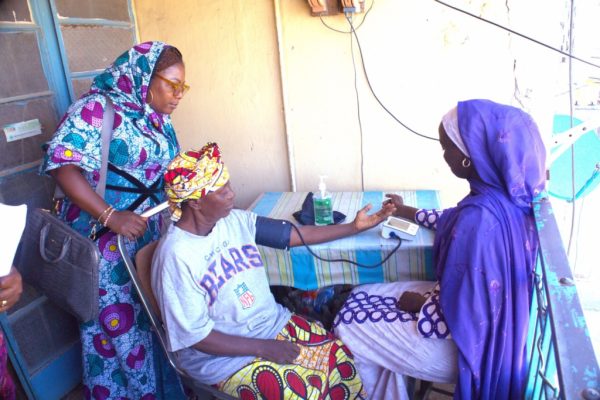By Moshood Isah
A recent engagement with communities in Kano and the Federal Capital Territory (FCT) revealed the heavy economic burden faced by individuals living with Non-Communicable Diseases (NCDs) such as hypertension and diabetes. Without proper management, these conditions can escalate into more severe health complications, including heart disease, stroke, and kidney failure. Despite their profound impact on public health and the growing prevalence of NCDs, one cannot help but question why these diseases receive far less attention and resources compared to others like HIV/AIDS. This stark disparity underscores the urgent need for a more focused and proactive approach to addressing the NCD crisis before it spirals further out of control.
While global efforts focus on high-profile public health emergencies, chronic non-communicable diseases (NCDs) continue to silently ravage rural communities in low- and middle-income countries (LMICs). It’s no surprise that NCDs now account for 71% of global deaths, with 29% of those occurring in Nigeria alone.
A recent World Health Organization (WHO) report reveals that around 76 million deaths could be prevented with early detection and effective treatment. In Nigeria, approximately 30% of adults suffer from hypertension, and 7% live with diabetes, making these two conditions among the most prevalent NCDs in the country. Beyond the statistics, this translates to lives lost, families torn apart, and communities becoming less productive and more vulnerable. Shockingly, the majority of people living with NCDs are unaware of their conditions, largely due to a lack of awareness about risk factors, leading to late diagnoses and inadequate treatment. This underscores the critical need for timely interventions in the detection and management of these diseases.
Unfortunately, access to quality, affordable care for NCDs remains a significant challenge, particularly in rural areas and primary healthcare settings. This is largely due to a combination of limited resources and socioeconomic factors, which have contributed to an environment where NCDs continue to thrive unchecked. Effective management of these diseases requires innovative and unconventional strategies, particularly in community engagement, education, and accessible healthcare.
Countries like Sri Lanka, Indonesia, Vietnam, and Bangladesh are taking intentional steps to integrate the WHO’s Package of Essential Non-Communicable Diseases (PEN) interventions into their primary health systems. This comprehensive, cost-effective approach aims to improve healthcare delivery, enhance health outcomes, and reduce the burden of NCDs, especially in underserved populations.
In Nigeria, eHealth Africa and the EHA REACH Clinic have also piloted the PEN intervention to improve rural access and address hypertension and diabetes in the Federal Capital Territory and Kano State. This approach emphasizes community engagement, cross-sector collaboration, data-driven decision-making, and access to essential medicines. With training on effective hypertension and diabetes management, Community Health Extension Workers (CHEWs) are now supporting over 200 patients in managing their conditions. This model has proven effective in improving health outcomes, especially in rural communities. In fact, CHEWs have become trusted figures who lead health education efforts on NCD prevention, conduct screenings, and help patients access healthcare services while educating them about lifestyle changes that reduce NCD risks.
While community engagement through CHEWs is essential, innovative digital health tools also play a critical role in improving NCD management. Mobile health tracking apps can motivate individuals to take control of their health and monitor their progress. These apps make educational content more engaging and accessible, helping to foster a more proactive approach to managing chronic diseases.
As seen in eHealth Africa’s work, regular supervisory visits can create a supportive environment for discussing treatment progress. Telemedicine and chatbots are also helping to streamline consultations, saving time and resources while ensuring patient confidentiality. These innovations are especially valuable for conditions that require ongoing monitoring and care.
Prevention is key in addressing chronic conditions like hypertension and diabetes. Community-based fitness and nutrition programs can support healthier lifestyles. Advocating for policies that improve health infrastructure in rural communities will complement these efforts. This includes better funding for primary healthcare facilities, transportation services for medical visits, and initiatives that promote healthier environments.
Most importantly, it is high time we prioritize NCDs and provide free medical support for conditions like hypertension and diabetes, just as we have for HIV/AIDS and other vaccine-preventable diseases. As HIV/AIDS has garnered global support for free treatment, we must now recognize the urgent need for equitable, accessible care for hypertension and diabetes. This will ensure that those affected are not left behind in the pursuit of better health outcomes. Given the long-term nature of these conditions, which often require ongoing medication, offering free treatment will significantly reduce the burden on individuals and healthcare systems alike.
In conclusion, prevention, early detection, and the integration of innovative approaches within primary healthcare systems are essential to tackling NCDs. These strategies will not only improve individual well-being but also strengthen the overall resilience of communities.
READ ALSO:
- Atta descendants plan convention to support homeland
- BREAKING: AFCON 2025 – Super Eagles To Face Tunisia, Uganda, Tanzania In Group C
- 2Baba Deletes Divorce-related Posts, Video On IG
- CAF Names Nine Stadiums For AFCON 2025
- Speed Darlington Reportedly Escapes Assassination Attempt


